Is it possible that while Chris was encircled by gorillas on one side of a mountain, Father of the Livery Calvert Markham was tracking gorillas down on the other side, in Uganda...?
Very shortly after becoming a freeman of the company, I signed up to spend a month in Rwanda, as a volunteer management consultant. My brief was to help a local charity – Good News of Peace and Development for Rwanda - to develop its financial processes, so it could instil more confidence in donors, and thus attract more donations.
The assignment was arranged via "Accountants for International Development". Various African destinations were discussed, and the gig in Rwanda was not finalised until a couple of days before departure.
Rwanda is a landlocked hilly country, with red soil and lots of vegetation. It is very green compared to other places I have been to in Africa. Everyone seems determined to look after the vegetation - neat grass, neat hedges everywhere. Kigali is a fast growing city that spreads across hilltops and valleys, so roads are quite steep in places. There is good town planning, so there are lots of great open spaces. The buildings are almost all post 1994 (the year of the genocide), with a few smallish skyscrapers.
I can’t think of an exact comparison with any other city, but maybe think of Singapore transplanted on to a mediterranean hilltown, with a very polite and friendly local culture where people, young women included, feel totally safe walking in the streets after dark. People generally wear western clothes, some of it second-hand. And there is NO litter anywhere. So that’s the Singapore comparison; there is a very strong ethos that all citizens must care for each other and the environment, and in fact every 4th Saturday they must all do an unpaid morning of local community service. You would be highly unlikely to find any Rwandan young adults wanting to risk their lives by traveling illegally on a boat to Europe.

In fact, the government has an aspiration to make Rwanda “the Singapore of Africa”. One day in a taxi I heard a radio advert encouraging people to apply to buy shares in the local bank, so it’s quite a financially sophisticated economy; and, as elsewhere in Africa, there are “mobile money” agents on every street corner. The Rwandan economy is based on services, an increasing amount of tourism, especially to see gorillas in the wild, and on agriculture - every single bit of flat land in the countryside is farmed, there is very little manufacturing. Rwanda has borders with currently unsafe Congo and Burundi, and many business people from those countries come into Rwanda to use the banks here. They also bring their kids to be educated in Rwandan boarding schools.
The history of the genocide in 1994 is very much an open topic of conversation in Rwanda; they do not sweep it under the carpet. On Friday 7 April we had the genocide memorial day, which stretches across 4 days. After I had been here a while, people started to volunteer their own experiences of the genocide. My host (see below) was a refugee abroad, but his parents were massacred in their home. The director of the charity (also see below) was discovered by killers hiding in a house with four friends, and escaped through prayer (to God, not to the killers). I have also visited a memorial church in the countryside (near where GNDPR sponsors a chicken farm, run by genocide widows), where a whole community was massacred – it’s a modern Catholic church on the outside, inside there is a small mountain of skulls and piles of clothing.
Equally, as a society they are very keen to move on and live in peace and prosperity.
On the streets, it was mostly private cars. There are motorcycle taxis, and the drivers are obliged to carry a spare helmet for passengers. In the suburbs there are also some bicycle taxis. There is no obvious deep poverty around. There are no street names, only letter and numbers such as KG 3, or KK22. The old street names were taken down because they reminded people of the genocide, and there is a government commission which is tasked with coming up with new, non-political street names. Many of the towns and cities have been renamed as well.
I stayed in a homestay in the suburbs, close to the airport. The house resembled a Mediterranean 2 storey villa with verandas and surrounded by nice gardens within the walled compound. Most houses in the suburbs are built inside their own walled compounds.
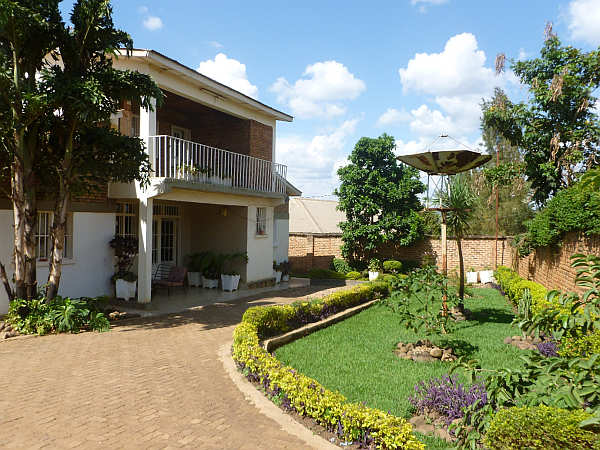
My host's house and garden
My host spent 30 years as a refugee, and so was not around during the genocide. He says that now he has finally been able to re-establish roots in Rwanda, it gives him real pleasure to have a nice house where he can host guests.
He was a student in Senegal, and then had a management job based in Senegal where he travelled across West Africa marketing cigarettes, until he decided he wanted to get out of a career where he was promoting lung cancer to kids
The whole family has a passion for healthy eating. Breakfast consists of delicious mangoes, papayas and avocados. There are no pets. It is not very common to see pets in Rwanda.
I had my own double bedroom - about the size of my bedroom at home, with mosquito net, and slept very comfortably. I had my own bathroom too. This took some getting used to. It was beautifully clean, and consisted of a western loo (sans loo seat) and a shower. Alas they had just installed a new power shower for my visit, which didn’t actually work, and the water pressure was poor unless you used the shower head at about knee level. So washing my hair was a challenge. Washing hands in the shower is OK, but brushing teeth in the dysfunctional shower was a new experience! So yes, like so many others I had “African showers”, being a bowl of hot water and a plastic mug used to scoop the water over my head and body.
Pius is the director of the NGO Good News of Peace and Development for Rwanda, where I was volunteering.
Pius’ office building is a nice bungalow in a residential suburb on the other side of the airport from the homestay. There were just three full time and one part time staff. Pius is the boss, and is a very professional charity director. Asnath is the part time accountant; she just started a couple of weeks before I arrived.
The accounting that the charity had been doing in recent years was less than basic, being a drawer full of unsorted invoices going back three years; but the great thing for me was that Asnath is very bright and well qualified. Apparently some AFID volunteers in the past have been in situations where the “accountant” that they have been asked to teach has never understood the concepts and therefore there is not much value the volunteer can add; so I was very pleased that this was not an issue for me. Then there was a cleaner / admin support lady, and the guy in charge of the mattress project.
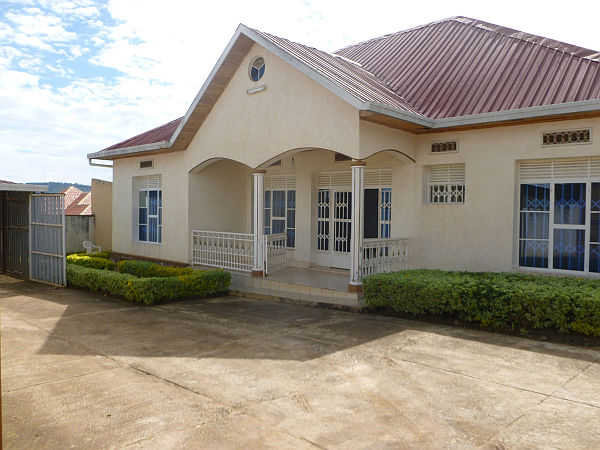
The Office...
The main project that the charity does is prison chaplaincy (they employ 10 part time chaplains). Then they also have projects where they buy mattress foam and fabric, and pay genocide widows to come to a workshop at the back of the office, where they assemble the mattresses which are then supplied free to prisoners. This particular project is paused for the moment, expecting some new funding next month. Then there are a couple of projects supporting genocide widows’ agricultural co-operatives, and there is a street kids catch up school in Kigali which the charity does not run but helps in finding sources of funding for it, and Pius is a director of it. To date most of their funds come from three American churches.
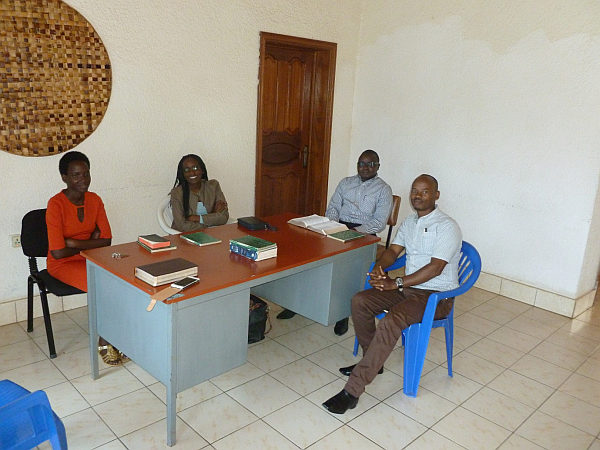
Left to right: Alphonsine, Asnath, Pius (Director) and Ernest - the staff at GNPDR
I asked Pius if I could accompany him on a chaplain’s visit to one of the prisons. He thought it would be unlikely, as it needed government permission, and then suddenly the permission came through for the following day. Then Pius told me out of the blue that I was expected to preach a sermon to 5000 prisoners. The fact that I am not an ordained preacher (I am just a volunteer youth worker in our church at home) was no consequence to him, but he gave me some bible verses to build a sermon on….
The prison was in the countryside, surrounded by fields which are worked by the prisoners. The prisoners, all men, range from street criminals to genocide killers. We were met at the prison admin block by their Director of Social Affairs, who introduced herself as a Christian. We then entered the main gate and, for someone whose image of a prison is an old and oppressive Victorian building, I was amazed to see a large open courtyard, like a small field, surrounded on three sides by modern three storey buildings, which I was told were built by the prisoners themselves. Laid out in the courtyard were about 500 wooden seats, and then there were several thousand prisoners watching from the balconies. At the top of this “amphitheatre” was another balcony, from which I was introduced and invited to preach for 20 minutes!
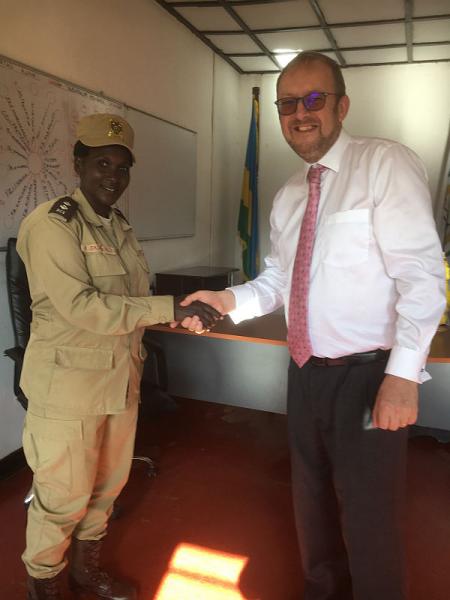
With Anne, the prison Director – the only photo I could take at the prison
The prisoners were mostly wearing their own clothes, but when they go out into the fields they must wear orange smocks and long orange shorts.
I sensed a really positive atmosphere in the prison, and a good number of the prisoners are Christians. To put this in context, about 80% of Rwandans are practising Christians. My talk (with Pius translating) seemed to go down well, and it was followed by Pius who invited those who wanted to become Christians to put up their hands and be prayed for. I don’t know how you calibrate this sort of response, but I can say that about 200 of the prisoners put up their hands. I read recently of a Chaplain General in the UK who said “I went to prison thinking I was taking Jesus with me, when I got in there I found that Jesus was already there”. That was certainly my experience too.
I attended Pius and Augustin’s church each Sunday, and really enjoyed it. For those who are interested in dynamic African worship, I will happily send you a link to a video I took of their “Igisirimba” worship, which is a bit like a workout in a gym!

On my first Saturday in Rwanda, my host drove me 2 hours north into the mountains, where we joined a trek to see gorillas. We found a family of eleven gorillas, including 3 silverbacks, very quickly, right down at the edge of the forest where it meets the fields. Apparently these gorillas had smelt some tasty bamboo in the area, which is why they were down there. We were able to stay one hour with the gorillas, and at one point they completely encircled our little group.
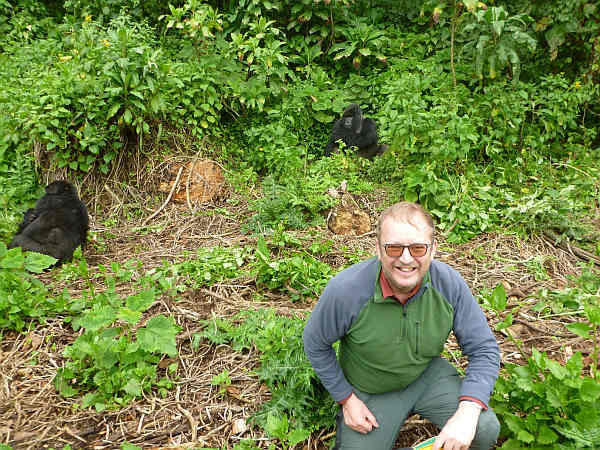
No gorilla was further than 20 yards from me, and some were a lot closer than that....
No gorilla was further than 20 yards from me, and some were a lot closer than that. The guide said we were very lucky to get that experience! I read Calvert’s [Markham] story of his gorilla trekking in Uganda, and it is possible we were on opposite sides of the same mountain on the same day....
The following Saturday I visited the sites in Kigali, the most important of which is the Genocide Memorial Museum, which is really nicely laid out in gardens / mass burial grounds (a quarter of a million murdered people are buried on this site), in a way that is very respectful to the families of all those who lost their lives in 1994. It is a very moving and educational experience. I also visited a posh hotel (Milles Collines, the one featured in the movie Hotel Rwanda) to go swimming, and visited a craft market.
Then on the final Friday and Saturday I went to the south of the country with my host, to the Nyungwe national park, where we stayed the night in a guest house in the rainforest, and then joined an early morning trek searching for chimpanzees. We did find some, and I got a few photos, but it was quite a challenge as the chimps spend most of their time hiding halfway up leafy trees, no doubt laughing at the tourists who are slipping and sliding on the vertiginous muddy forest floor below them! On the way back to Kigali we followed the eastern shore of Lake Kivu, which is one of the African great lakes, The scenery is a bit like some of the Swiss lakes, and you look across the water to the mountains of Congo.

So, a great time volunteering! I see many opportunities that the company promotes, to volunteer in East London. I am absolutely up for that, but if anyone has an opportunity for me to volunteer as a consultant in the developing world, I will get on the plane tomorrow.
Chris Sutton, Freeman